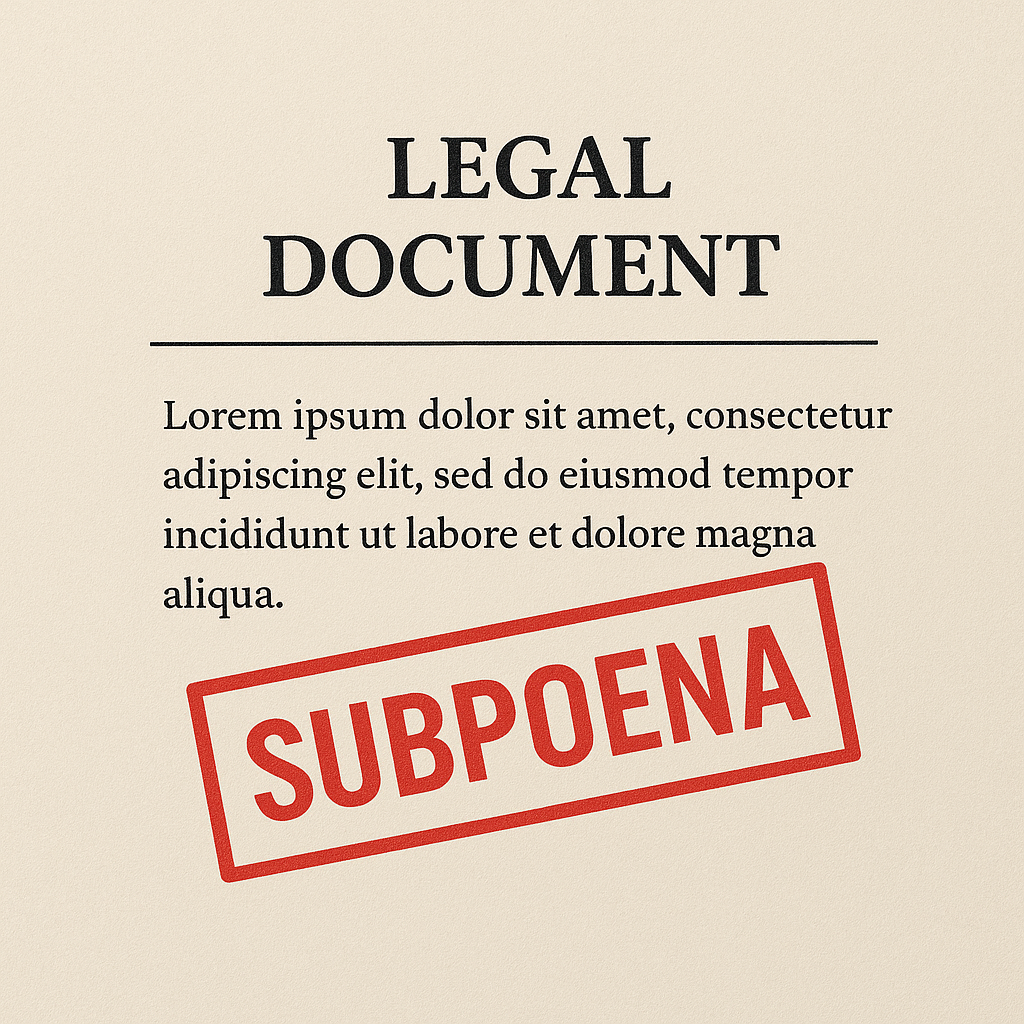Lively v Badoni: When the Legal Spotlight Turns to Superstars

The ongoing legal saga between actors Blake Lively and Justin Baldoni surrounding the movie "It Ends With Us" has
taken a dramatic turn, with reports emerging that global music icon Taylor Swift has been subpoenaed. This development has not only amplified the public interest in the case but also serves as a timely reminder of the legal mechanisms available to parties in litigation to compel the production of evidence.
For those outside the legal profession, the concept of a subpoena might seem like something confined to television dramas. However, it is a crucial tool in the pursuit of justice, allowing parties to obtain necessary information and testimony to support their case. In Australia, the power to issue a subpoena is vested in the Courts, but it is not a power to be exercised lightly. There are important thresholds that must be met before a Court will compel a person, even a megastar like Taylor Swift, to appear in Court or produce documents.
The Purpose and Types of Subpoenas
In essence, a subpoena is a formal legal document issued by a Court that requires a person to do one or both of the following:
- Attend court to give evidence: This is known as a subpoena to give evidence.
- Produce documents or other things to the court: This is a subpoena for production.
- Do both of the above: This is a subpoena for production and to give evidence.
Before seeking a subpoena, parties are generally expected to have made reasonable attempts to obtain the required information or evidence through less coercive means, such as directly requesting documents or asking a person to provide an affidavit. Subpoenas are not intended to be used as a first resort or as a tool for a "fishing expedition" to see what information might turn up.
Thresholds for Issuing a Subpoena in Australia
Australian Courts adhere to specific principles when considering whether to issue a subpoena. The key thresholds that generally need to be satisfied include:
- Relevance: The evidence or documents sought must be relevant to the issues in dispute in the case. The subpoenaing party needs to demonstrate a legitimate forensic purpose for the request, meaning the information sought has the potential to advance their case. A subpoena will likely be refused if it seeks irrelevant material or appears to be an attempt to gather information that is not tied to the specific legal claims. For example, in a contractual dispute, a subpoena seeking unrelated personal financial records of the other party would likely be deemed irrelevant.
- Necessity: The subpoena should be reasonably necessary to obtain the evidence. If the same information can be obtained through other, less intrusive means, the court may be hesitant to issue a subpoena.
- Legitimate Forensic Purpose: As mentioned, there must be a genuine legal reason for seeking the evidence. A subpoena should not be used for an improper purpose, such as harassment, delaying tactics, or to exert undue pressure on a party or witness.
- Specificity: A subpoena for production of documents must clearly and specifically identify the documents required. Broad or vague requests that place an unreasonable burden on the recipient to search for and produce a large volume of unspecified material are likely to be challenged and potentially set aside by the Court as "oppressive." Example of a specific request: "All emails sent between John Doe and Jane Smith between January 1, 2024, and December 31, 2024, relating to the Smith & Co. Project." Example of an overly broad request: "All documents in your possession relating to John Doe."
- Conduct Money and Witness Fees: When serving a subpoena, the issuing party is typically required to provide the person being subpoenaed with "conduct money," which is an amount sufficient to cover their reasonable expenses in complying with the subpoena. For attending Court to give evidence, witness fees are also payable to compensate for their time and any loss of earnings. The specific amounts are often set by court rules. Failure to provide adequate conduct money can be grounds for a person to refuse to comply with a subpoena.
The Lively v Badoni Matter and the Swift Subpoena
While the full details of why Taylor Swift has been subpoenaed in the Lively v Badoni case are still emerging, reports suggest it relates to text messages exchanged between Blake Lively and Justin Baldoni where Swift is mentioned. Baldoni's legal team may believe that Swift possesses information relevant to his defamation lawsuit against Lively and her husband, Ryan Reynolds.
A spokesperson for Taylor Swift has reportedly dismissed the subpoena as a publicity stunt, highlighting that her only connection to the film was licensing a song. This underscores the point that for a subpoena to be valid, the person or entity being compelled to provide evidence must genuinely possess information relevant to the legal proceedings.
Challenging a Subpoena
If a person believes that a subpoena has been improperly issued or that the thresholds have not been met, they have the right to challenge it in Court. Common grounds for challenging a subpoena include:
- Irrelevance of the information sought.
- The subpoena being oppressive or placing an unreasonable burden.
- Lack of a legitimate forensic purpose.
- The information being protected by privilege (e.g., legal professional privilege).
- Insufficient conduct money or witness fees being provided.
- Improper service of the subpoena.
Conclusion
The subpoena served on Taylor Swift in the Lively v Badoni case serves as a high-profile example of the legal process for obtaining evidence. While it might generate significant media attention, the underlying principles remain the same for all subpoenas issued in Australia. Courts carefully consider whether the necessary thresholds of relevance, necessity, legitimate purpose, and specificity have been met, ensuring that this powerful legal tool is used appropriately and fairly.
For anyone facing the prospect of being subpoenaed, or for parties considering issuing one, understanding these thresholds and seeking legal advice is paramount to navigating the complexities of the legal system.

Senior Solicitor
Email: kristen@hntlegal.com.au
Author
List of Services
-
Matthew HammondMatthew Hammond Matthew Hammond
-
Vivian NguyenVivian Nguyen Vivian Nguyen
-
Maria ValenzuelaMaria Valenzuela Maria Valenzuela
-
David CleverleyDavid Cleverley David Cleverley
-
Peter MorrisPeter Morris Peter Morris
-
Andrew PaciniAndrew Pacini Andrew Pacini
-
Marie-Cecilia FerreiraMarie-Cecilia Ferreira Marie-Cecilia Ferreira
-
Jabour HaddadJabour Haddad Jabour Haddad
-
Razeeha ReillyRazeeha Reilly Razeeha Reilly
-
Jack DunnJack Dunn Jack Dunn
-
Melanie KorialMelanie Korial Melanie Korial
-
Mahdi RahimzadaMahdi Rahimzada Mahdi Rahimzada
-
Albert ThaiAlbert Thai Albert Thai
-
Martin AbdelsayedMartin Abdelsayed Martin Abdelsayed
-
Rachel SiewRachel Siew Rachel Siew
-
Jamie-Lee MerhiJamie-Lee Merhi Jamie-Lee Merhi
-
Lina VoLina Vo Lina Vo
-
Georgia MoaitGeorgia Moait Georgia Moait
-
Sarah FoddaSarah Fodda Sarah Fodda
-
Alessia GiglioAlessia Giglio Alessia Giglio
-
Alexander BatshonAlexander Batshon Alexander Batshon
-
Andre BarkhoAndre Barkho Andre Barkho
-
Gauri KoteraGauri Kotera Gauri Kotera
-
Bridgette EdmundsBridgette Edmunds Bridgette Edmunds
-
Michelle GalaritaMichelle Galarita Michelle Galarita
-
Bea OctavaBea Octava Bea Octava
-
Liber ReboquioLiber Reboquio Liber Reboquio
-
Jing DyJing Dy Jing Dy
Share to










